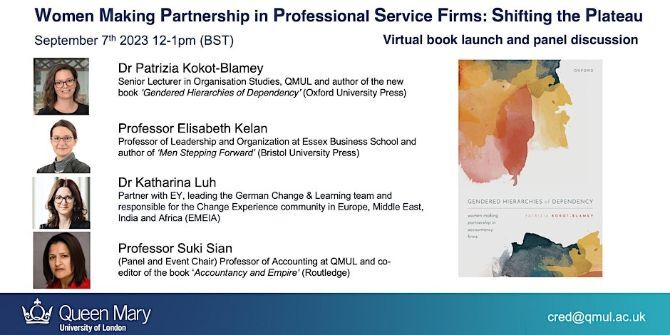Gendered Hierarchies of Dependency
Gendered Hierarchies of Dependency: New book by Dr Patrizia Kokot-Blamey explores how organisational hierarchies are negotiated across borders and takes aim at persistent underrepresentation of women in top positions in Professional Service Firms.
Women’s access to the professions has improved remarkably over the past 20 years, and Professional Service Firms such as the Big-4 have invested heavily in Equality, Diversity, and Inclusion drives, with some, such as Deloitte, regularly featuring in Best Workplaces for Women rankings. But the number of women at the very top has failed to budge significantly over the same period with women making up just over 20-23% of partners in larger firms. The new book ‘Gendered Hierarchies of Dependency’ by Dr Patrizia Kokot-Blamey analyses this stickiness at the top of a profession which plays a vital role in shaping decisions significant to the economy at large - auditing accounts, advising governments, navigating takeovers, and planning and executing restructuring and downsizing exercises.Using a cross-national comparative lens, this new book queries whether a focus on performance, blind recruitment, and data-driven HR interventions has done anything but alienate people from one other. Dr Patrizia Kokot-Blamey explains: ‘We all spend so much time at work and, at the same time, work for many of us is no longer a place where we develop friendships or relationships of trust. A shift away from relationship-based hiring has succeeded in getting more women through the door, but when we look at it comparatively, we can see that they are not as secure in their positions.’At the same time, Kokot-Blamey finds that the price of making it to the top is still frequently motherhood, indicating that flexible working and equal opportunity initiatives continue to fail in their purpose. “There is nothing wrong with prioritising one’s career, but for many women giving up family life and motherhood in this way will be a cost too high to pay”, says Kokot-Blamey.Praise for the book includes: “Drawing on a rich body of empirical material, Patrizia Kokot-Blamey offers a compelling comparative analysis of how women partners make sense of careers, sexism, motherhood, and job security in Germany and the UK. A thought-provoking book!” Elisabeth Kelan, University of Essex (author of ‘Men Stepping Forward: Leading Your Organisation on the Path to Inclusion). “Gendered Hierarchies of Dependency provides a stark reminder of the pressure employers place on workers even at high levels in organisations to comply with their conditions or else face redundancy and that, while there has been a profound change in women’s lifestyles, limitations remain, not so much from the fact that they care but that many men do not.” Diane Perrons, LSE (author of ‘Is Austerity Gendered?’) The book is available in hardback and ebook from publisher Oxford University Press.A one-hour virtual lunch time book launch organised by the Centre for Research in Equality and Diversity, QMUL will take place on Thursday 7 September 2023 at 12-1pm. Here Dr Kokot-Blamey will be joined by Professor Elisabeth Kelan (University of Essex), Dr Katharina Luh (Partner with EY), and Professor Suki Sian (QMUL). Book your place on Eventbrite.Dr Patrizia Kokot-Blamey is available to write articles or for interviews. Please contact James Cleeton in Queen Mary University of London’s press office: j.cleeton@qmul.ac.uk / 020 7882 6514About Dr Patrizia Kokot-BlameyDr Patrizia Kokot-Blamey is a Senior Lecturer in Organisation Studies at Queen Mary University of London. She holds a Ph.D in Gender Studies from the LSE and undergraduate and a Master’s degree in Economics from Maastricht University. She writes on women and the professions, fertility and employment and has published in top journals such as Accounting, Organizations and Society (FT Top 50) and Gender, Work and Organizations. About Queen Mary University of LondonAt Queen Mary University of London, we believe that a diversity of ideas helps us achieve the previously unthinkable. Throughout our history, we’ve fostered social justice and improved lives through academic excellence – and we continue to live and breathe this spirit today, not because it’s simply ‘the right thing to do’ but for what it helps us achieve and the intellectual brilliance it delivers. A member of the prestigious Russell Group, Queen Mary is a research-intensive university that connects minds worldwide. We work across the humanities and social sciences, medicine and dentistry, and science and engineering, with inspirational teaching directly informed by our world-leading research. Our distinctive history stretching back to 1785 is built on four historic institutions (the London Hospital Medical College, St Bartholomew’s Medical College, Westfield College and Queen Mary College) with a shared vision to provide hope and opportunity for the less privileged or otherwise under-represented. Today, we remain true to that belief in opening the doors of opportunity for anyone with the potential to succeed and helping to build a future we can all be proud of. Visit qmul.ac.uk to find out more.

Read about the Innovation Festival for Global Working in the Summer issue of Think Global People magazine and about this year's winners of Relocate and Think Global People Awards in the special supplement. Download your copy here.
Find out more about the Think Global People community.
Subscribe to Relocate Extra, our monthly newsletter, to get all the latest international assignments and global mobility news.Relocate’s new Global Mobility Toolkit provides free information, practical advice and support for HR, global mobility managers and global teams operating overseas.
©2024 Re:locate magazine, published by Profile Locations, Spray Hill, Hastings Road, Lamberhurst, Kent TN3 8JB. All rights reserved. This publication (or any part thereof) may not be reproduced in any form without the prior written permission of Profile Locations. Profile Locations accepts no liability for the accuracy of the contents or any opinions expressed herein.






























